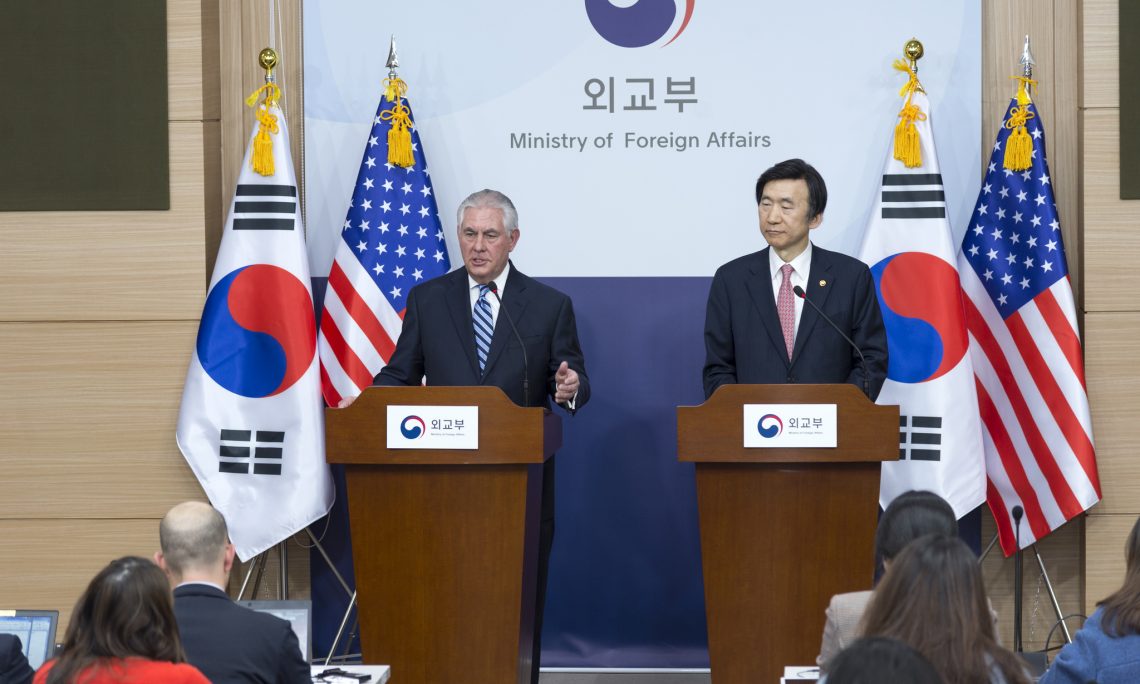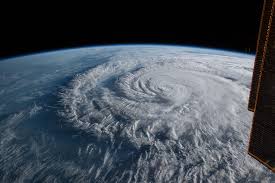By: Cameron Bell*
Since his election in 2016, President Trump has railed against numerous international organizations including the World Trade Organization (WTO). President Trump argues that membership in the WTO harms U.S. economic interests, and his administration has blocked the replacement of numerous WTO judges, placing the organization on shaky ground, which may lead to functional paralysis by the Fall of 2019.[1] In recent weeks these verbal jabs and acts of obstructionism have escalated into outright threats by President Trump to withdraw the U.S. from the WTO entirely.[2] These threats come at a time of increased global economic uncertainty due to the ongoing trade disputes between the U.S. and many of its well-established trading partners including China, Japan, Canada, the European Union, Mexico, and Turkey.
Given the fragility of the global economy and the current threats against the WTO, it is important to take a brief look into the history of the World Trade Organization and the post-WWII international trade system to gain an understanding of how and why it was created. It is also important to understand why it is beneficial for states to sacrifice a portion of their sovereignty for the stability and assurances that come from being a member in such organizations. This analysis will show that it is in the best interests of the U.S. to maintain and increase its involvement in the WTO, and that a withdrawal from this organization would result in U.S. markets losing access to an organization which reduces trade barriers and creates a stable environment for conflict resolution, placing the United States in a weakened and perilous position.
Essential to understanding the importance of the World Trade Organization is understanding the financial turmoil of the early 20th century that led to its creation after WWII. In the late 1920s and early 1930s the global economy experienced the shock of the Great Depression. This global depression occurred in part due to protectionist policies enacted by governments around the world. In response to this dramatic economic downturn, governments increased their protectionist policies beginning in the United States with the implementation of the Smoot-Hawley Tariff Act of 1930.[3] This prompted numerous other governments to follow suit with their own protectionist policies, which led to a crippling decline in global trade.[4] The protectionist policies enacted at this time included large scale currency devaluation and dramatic increases in tariffs.[5] In short, these policies created a self-reinforcing loop in which each country had to increase their tariffs and devalue their currencies in vain attempts to combat other governments doing the same. This spiral of protectionist policies continued throughout the 1930s and into WWII despite brief attempts to stop it such as the 1934 Reciprocal Trade Agreements Act.[6] It was not until WWII began that governments began examining new methods to prevent such harmful activity in the future.
The unprecedented death and destruction of WWII gave governments in the postwar years the motivation to create systems to communicate and work together to avoid such catastrophes in the future. A new international economic system was envisioned through the Bretton-Woods Agreement, developed under U.S. auspices, which would have created the International Trade Organization (ITO).[7] The ITO would have governed international trade, competition policies, and commodity agreements among other related policy areas.[8] However, the U.S. Congress rejected the ITO, which was quickly replaced by the General Agreement on Tariffs and Trade (GATT). Twenty-three governments including the United States, which dominated the post-war global economy and sought to create a new international system for trade based on institutions, signed on to the GATT by 1947.[9] This agreement created a new system for international trade, one based on rules rather than results.[10] While the GATT focused mainly on trade in goods, changes in technology and other economic drivers eventually revealed the need for expanded oversight in new areas such as intellectual property and trade in services. Recognizing this need for reform and expansion, global trading powers including the United States held discussions in the 1980s dubbed the Uruguay Round. It eventually resulted in the creation of the WTO on 1 January 1995.[11]
The WTO advances the ruled-based trading system that has dominated the post-WWII global market. Membership in the WTO, which now includes 164 member-states, has proven to be a benefit to domestic economies primarily by minimizing the fixed cost of trade by reducing trade barriers.[12] Furthermore, membership in the WTO provides a stability and certainty to the markets which otherwise does not exist, allowing the markets to feel comfortable expanding into new markets and therefore increasing trade.[13]
However, it is not just the monetary benefits and positive market mentality which are important when analyzing the significance of WTO membership. Crucial as well is understanding why governments sign on to these international organizations and agreements in the first place. In discussing the creation of international laws, Daniel Moynihan asserts that there is a school of legal reasoning which claims that “law exists when and as it is necessary for it to exist.”[14] This reasoning stands out as crucial to understanding the importance of a rules-based international trading system, overseen by an organization such as the WTO, considering the global economic chaos witnessed in the 1930s. This economic instability practically demanded the creation of broad international economic agreements post-WWII. Furthermore, J.L Brierly in his formative work, The Law of Nations, describes international law as allowing for transnational understanding and frameworks for response.[15] International law provides structures and mutual understandings through which states understand the actions of others. More importantly however, international law provides frameworks for responses to violations. For instance, actions considered direct acts of aggression are specified in the UN Charter, granting states a measure of surety in their actions. These specifications provide a certain stability to state actions and reactions. If a state undertakes an action which constitutes an act of aggression, international law, through the UN Charter, makes clear that the victim state is entitled to respond with force. The repercussions of such violations are clearly stated and understood in the international community. These are the transnational understandings and response frameworks discussed by J.L. Brierly; they provide stability to state actions. Each government understands that due to international law, certain actions may precipitate corresponding responses. This promotes stability in the global environment and provides a framework to avoid escalation.
This same understanding can be expanded to include organizations such as the WTO. Governments commit themselves to such organizations because they breed stability and work to avert conflict. Without such organizations and agreements, there is no framework for conflict resolution, therefore increasing the probability of repeating the mistakes that led to global economic disaster in the early 1930s. The most basic and critical function of the WTO is to establish and maintain a framework through which governments can resolve conflicts and avoid ‘tit-for-tat’ trade wars which may cripple the global economy and devolve into martial conflict. The added economic stability and growth in trade are bonuses on top of this most fundamental mission of the WTO. This is the foundation which President Trump and his administration are currently undermining.
President Trump has repeatedly stated that the WTO is unfair to the U.S. in its dispute settlements.[16] The WTO Dispute Settlement Body (DSB), “which adjudicates agreement infractions and enforces rules with authorized retaliatory measures for harmed countries as punishment,” operates using a panel of three judges selected from the Appellate Body, a group of seven qualified persons who serve for a term of four years.[17] If one of the judges happens to have a conflict of interest, for instance in certain cases involving their home countries, they must recuse themselves, in which case they are replaced by another Appellate Body member, maintaining the three judge panel.[18] Recently, the United States has been blocking the appointment of new members to the Appellate Body, sending fears throughout the global economy that the U.S. intends not just to withdraw from the WTO but to cripple its ability to function.[19] This threat comes despite the U.S. holding the rare privilege of always having an American occupy a position on the Appellate Body.[20] Furthermore, despite President Trump’s claim that the WTO is set up “to benefit everybody but us” and that “we lose the lawsuits, almost all of the lawsuits in the WTO,” the United States has won roughly 90% of the cases it has brought to the WTO.[21] However, while the U.S. loses roughly 89% of the cases brought against it, the U.S. overall maintains a roughly 50/50 win-loss split.[22] These high ratios are not surprising, given that claimants on WTO disputes typically only bring a case to the DSB if victory is certain.[23]
While the U.S. has not been treated unfairly by the DSB, it would be wrong to ignore genuine problems with the WTO. These include the charges that the WTO promotes trade in an uneven fashion and practices the ‘most-favored nation’ principle, under which member countries must provide equal market access to other member-countries, which critics argue harms multilateral efficiency.[24] These are legitimate problems within the WTO structure, but there are already potential solutions being proposed that do not involve destroying the organization.[25] Rather than destroying a rules-based system which took a global economic meltdown, a world war, and the better part of a century to create, and one in which the U.S. has maintained equal or favorable win/loss ratios, the preferable and less harmful option is to work to fix these issues while keeping the organization intact.
President Trump’s stated desire to remove the U.S. from the WTO is short-sighted and ill-informed, and it would place the U.S. in a weakened international position both geopolitically and economically. The U.S. economy would then be subject to the whims of other governments with no international legal structure or framework for resolution. Understanding the history of the WTO and the current rules-based international system is critical to comprehending the purpose of the WTO and other international laws and agreements. Sovereign states do not enter into international agreements for any small reason. These organizations, agreements, and laws provide frameworks for negotiations and predictable behaviors, which are imperative in the construction of a stable global environment capable of avoiding the worst outcomes. President Trump’s undermining of the rules-based system is hazardous for the U.S. economy and, if successful, will place the United States in a perilous and isolated position.
[1] Tom Miles, “U.S. blocks WTO judge reappointment as dispute settlement crisis looms,” Reuters August 27, 2018. https://www.reuters.com/article/us-usa-trade-wto/us-blocks-wto-judge-reappointment-as-his-term-nears-an-end-idUSKCN1LC19O Accessed: 9/9/2018
[2] BBC, “Trump threatens to pull US out of World Trade Organization,” BBC, August 31, 2018. https://www.bbc.com/news/world-us-canada-45364150 Accessed: 9/9/2018
[3] Roger Porter, “The World Trade Organization at Twenty,” The Brown Journal of World Affairs Vol. 21 Issue 2 (Spring/Summer 2015). p. 104-105.
[4] Ibid.
[5] Martina Piewitt, “The creation of the World Trade Organization and the establishment of an advocacy regime,” Journal of Public Affairs Vol. 15 No. 1. (2013). p. 63.
[6] Roger Porter, “The World Trade Organization at Twenty,” p. 105.
[7] Martina Piewitt, “The creation of the World Trade Organization,” p. 63.
[8] Roger Porter, “The World Trade Organization at Twenty,” p. 105.
[9] Richard Baldwin, “The World Trade Organization and the Future of Multilateralism,” Journal of Economic Perspectives Vol. 30 No. 1 (Winter 2016). p. 95, 97.
[10] Ibid. p. 97.
[11] Pushan Dutt, Illian Mihov, Timothy Van Zandt, “The effect of WTO on the extensive and the intensive margins of trade,” Journal of International Economics 91 (2013) p. 204.
[12] Ibid. p. 213.
[13] Ibid.
[14] Daniel Patrick Moynihan, On the Law of Nations. (Cambridge: Harvard University Press, 1990). p. 8.
[15] J.L. Brierly, The Law of Nations: An Introduction to the International Law of Peace. (Oxford: Oxford University Press, 1963). p. 59.
[16] Dan Ikenson, “US Trade Laws And The Sovereignty Canard,” Forbes, March 9, 2017. https://www.forbes.com/sites/danikenson/2017/03/09/u-s-trade-laws-and-the-sovereignty-canard/#249ac558203f Accessed: 9/9/ 2018.
[17] David J. Kuenzel, “WTO dispute determinants,” European Economic Review 91 (2017) p. 157.; The World Trade Organization, “Appellate Body Members,” WTO https://www.wto.org/english/tratop_e/dispu_e/ab_members_descrp_e.htm
[18] WTO, “WTO Rules of Conduct, Annex II,” World Trade Organization https://www.wto.org/english/tratop_e/dispu_e/ab_e.htm#annexii Accessed: 9/9/2018.
[19] Tom Miles, “U.S. Blocks WTO judge,” https://www.reuters.com/article/us-usa-trade-wto/us-blocks-wto-judge-reappointment-as-his-term-nears-an-end-idUSKCN1LC19O Accessed: 9/9/2018.
[20] Ibid.
[21] BBC, “Trump threatens to pull US out of World Trade Organization,” https://www.bbc.com/news/world-us-canada-45364150 Accessed: 9/9/2018.
[22] BBC, “Trump threatens to pull US out.”; Dan Ikenson, “US Trade Laws,” https://www.forbes.com/sites/danikenson/2017/03/09/u-s-trade-laws-and-the-sovereignty-canard/#249ac558203f Accessed: 9/9/2018.
[23] Dan Ikenson, “US Trade Laws,” https://www.forbes.com/sites/danikenson/2017/03/09/u-s-trade-laws-and-the-sovereignty-canard/#249ac558203f Accessed: 9/9/2018.
[24] Theo S. Eicher, Christian Henn, “In search of WTO trade effects: Preferential trade agreements promote trade strongly, but unevenly,” Journal of International Economics 83 (2011) 137, 152.; Kyle Bagwell, Robert W. Staiger, “Backward stealing and forward manipulation in the WTO,” Journal of International Economics 82 (2010), 49, 60-61.
[25] Kyle Bagwell, “Backward stealing.” p. 60-61.
*Disclaimer: The content contained in the following material is the sole ownership of the author and does not reflect the Towson University Journal of International Affairs nor Towson University in any respect whatsoever.







